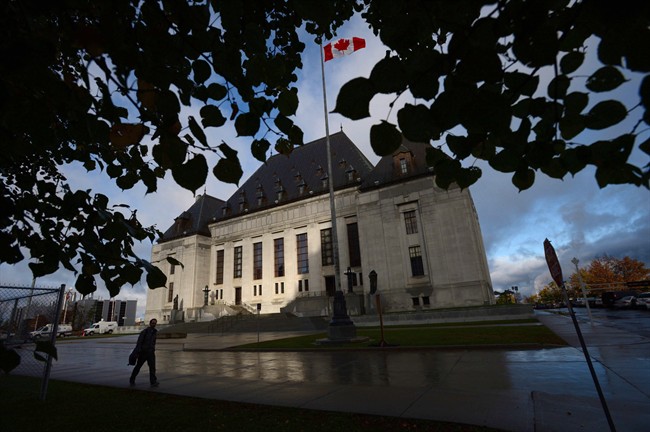OTTAWA – Canada’s top court will today confront an elemental – some would say intractable – question: whether Canadians have the right to seek help to end their own lives.

The Supreme Court is convening this morning to hear a new challenge to Canada’s existing and long-standing ban on physician-assisted suicide.
The court last considered the issue in 1993 when it ruled that where assisted death is concerned, certain rights enshrined in the Charter of Rights and Freedoms are trumped by the principles of fundamental justice.
Twenty years later, right-to-die advocates say the legal and moral landscape in Canada has changed, and the laws need to change with it.
“The federal government has no place at the bedside of dying Canadians,” said Grace Pastine, the litigation director of the B.C. Civil Liberties Association, on behalf of several B.C. families.
READ MORE: Majority of Canadians support assisted dying, poll suggests
The organization launched what’s become known as the ‘right to die with dignity’ lawsuit in 2011 after B.C.’s Gloria Taylor set about ending her life following a diagnosis of Lou Gehrig’s disease.
In June 2012, the B.C. Supreme Court agreed that existing laws did deny Taylor the right to control her own life, and gave the court a year to write new ones. At the same time, they gave her an exemption so she could get help ending her own life.
- B.C. to ban drug use in all public places in major overhaul of decriminalization
- 3 women diagnosed with HIV after ‘vampire facials’ at unlicensed U.S. spa
- Solar eclipse eye damage: More than 160 cases reported in Ontario, Quebec
- ‘Super lice’ are becoming more resistant to chemical shampoos. What to use instead
Taylor died before that could happen and the case was appealed to the Supreme Court.
The argument that assisted suicide prohibitions violate the charter rests on two sections: Section 7, which sets out the right to life, liberty and security of the person, and Section 15, which grants equality rights.
It’s an argument that has been tried before – in 1993 the Supreme Court was asked by Sue Rodriguez whether existing laws violated her charter rights.
Rodriguez also had Lou Gehrig’s disease, formally known as amyotrophic lateral sclerosis, or ALS, and wished to end her life, famously saying, “Whose body is this? Who owns my life?”
In a 5-4 decision, the court ruled that while the laws did violate her rights, they were overridden by the principles of fundamental justice.
“Given the concerns about abuse and the great difficulty in creating appropriate safeguards, the blanket prohibition on assisted suicide is not arbitrary or unfair,” the court said.
READ MORE: Dying Canadians need Supreme Court’s help: lawyer
“The prohibition relates to the state’s interest in protecting the vulnerable and is reflective of fundamental values at play in our society.”
More than 20 years later, the government is arguing that nothing has changed, in spite of the fact that the issue has been debated several times in Parliament.
“There is no indication that Parliament’s refusal to change the law is the result of an unwillingness to address the issue,” the government argues in its factum.
“During the debates, parliamentarians canvassed many, if not all, of the issues raised in the present litigation, including: the adequacy of safeguards; the duty of Parliament to protect human life, especially the lives of vulnerable individuals; the experiences of countries in which assisted suicide has been legalized; and the negative message concerning the value of human life that would be sent to all Canadians if assisted suicide were permitted.”



Comments